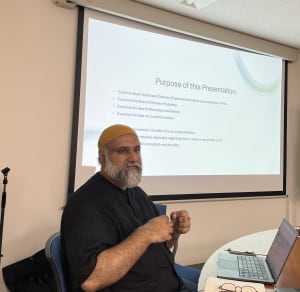Report
On August 25, the Tobuken Seminar "Islamic Modernities: The Ulema Between Revolution and Reaction in the Late Ottoman Empire" was held at the IASA. Dr. Yakoob Ahmed of Istanbul University, who has been a visiting researcher at the IASA since October 2024, presented the lecture. During his lecture, Dr. Ahmed examined the role of the ulema during and after the Young Turk Revolution, discussing how the provincial and central ulema played an active role in the constitutional revival in the time of revolution, and how those who were marginalized after the revolution and demanded justice were labeled "reactionary." Dr. Ahmed also emphasized the presence of the ulema in the constitutional amendment committee. During the Q&A session, many questions were raised, some regarding the definition of "ulema" and the origin of the term "irtica." There were eight participants in person and nine online.
Event Details
Date and time: August 25, 2025 (Mon), 4pm~6pm
Venue: Institute for Advanced Studies on Asia, Second Conference Room (302)/Zoom
Speaker: Yakoob Ahmed (Istanbul University / IASA Visiting Researcher)
Title: Islamic Modernities: The Ulema Between Revolution and Reaction in the Late Ottoman Empire Chair: Jun Akiba (IASA, U Tokyo)
Lecture abstract:
The prevailing narrative of the 1908 Ottoman Constitutional Revolution and the 1909 "Counterrevolution" often casts the former as a secular, progressive upheaval and the latter as a reactionary Islamic backlash. This presentation challenges that binary by re-examining the role of the Ottoman ulema in both events. Far from being a monolithic or reactionary bloc, the ulema were deeply embedded in the constitutionalist and reformist currents of the time, with many supporting the restoration of the 1876 constitution in 1908. Likewise, participation in the 1909 "Counterrevolution" was not merely a rejection of modernity, but a multifaceted response that involved competing visions of Islamic governance and moral order. By highlighting the diversity of religious thought and political engagement among the ulema, this talk argues that both the revolution and the counterrevolution unfolded within an Islamic paradigm—one that accommodated contestation, reform, and authority in dynamic ways. This reinterpretation reframes the ulema not as passive relics of a crumbling empire, but as active agents in a transformative moment of Ottoman political life.


